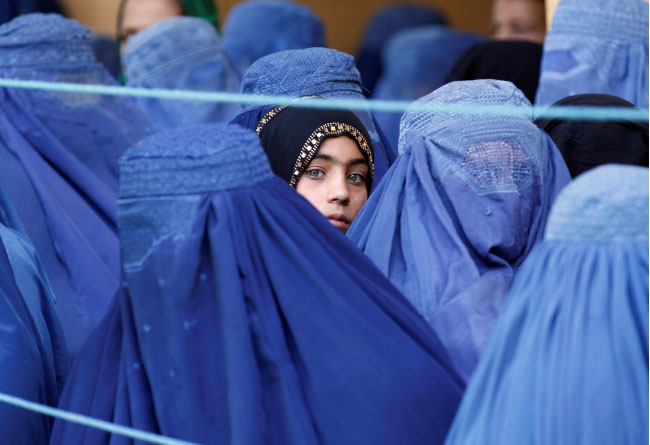Woman, who is treated as historical pariah, lives a no is some life. She is doomed to suffer overwhelming pain and anguish in one way or another. Her beauty is deemed suitable for advertisement gimmicks and amorous films, her modesty is tainted and her rights and dignity are trampled upon. Her dulcet voice and strong emotional character are used to embellish lucrative and sentimental movies. Her feminine charms and fetishes are used to tantalize the viewers in movie theaters. Her tears roll down her cheeks either in romantic films or under the fists of a cruel man. Her blood is shed not by the villains in movies but by the vicious characters on the surface of earth.
In traditional society like Afghanistan, women’s freedoms and social role are restricted within the cultural frames. In another item, they encounter manifold socio-cultural barriers to take active role in social issues. A woman is considered as a productive creature to give birth and to feed and train her children. She is chained in cradle at birth, bound to suffer within the four walls of the kitchen and finally buried in an unmarked grave or her ashes will melt away – she takes all her dreams to the grave with her. This is her role she plays in the traditional community like Afghanistan.
The truth is that a backlash against women rights campaigns started back in 2001 after the overthrow of the Taliban. Its first public face was the young TV presenter ShaimaRezayee. Accused of flirting on TV, the music show presenter was found shot dead in 2005. The murder was never fully investigated but rumors abounded that hers was a Taliban murder or maybe an “honor killing”. That these two possibilities could be expressed in one breath showed that the misogyny of the average Afghan family was perhaps not vastly different from that of a Taliban state.
Since the fall of the Taliban in 2001, Afghan women have made significant advances in rights, with millions of girls attending schools and women holding government posts. But with the steady withdrawal of foreign forces and the Taliban insurgency still resilient, there are growing fears the gains will be lost. “Afghanistan is facing an uncertain future, and is at arguably the most critical moment in its recent history. Now is not the time for international governments to walk away.”
Despite the progress made, women’s struggle for civic and human rights still has a long way to go. Three decades of war has left many Afghans both eager for change and afraid of it. There are still many instances of ordinary women experiencing domestic violence, being sexually abused, or being forced into marriage. Women in senior leadership roles – such as in parliament or the police – are still being murdered. Some men feel threatened by the presence of women in senior positions. These men see women’s rights as the “westernization” of Afghan culture.
A report has found out that by the time women facing violence reached institutions or informal mechanisms to report abusive conduct, they were often physically and mentally traumatized, with little or no financial and emotional support. For instance, women will be coerced to abandon their husbands’ home in case of filing complaints against them. Therefore, a large number of cases will remain unreported.
Women should no more suffer men’s fractious attitudes, mental and physical tortures. The religious guidelines and country’s law should be practiced upon and the patriarchal system should end so that women’s rights and dignity be held in respect. The Constitution of Afghanistan states in article 22 as, “Any kind of discrimination and distinction between citizens of Afghanistan shall be forbidden. The citizens of Afghanistan, man and woman, have equal rights and duties before the law.” Moreover, article 24 asserts, “Liberty is the natural right of human beings. This right has no limits unless affecting others freedoms as well as the public interest, which shall be regulated by law. Liberty and human dignity are inviolable. The state shall respect and protect liberty as well as human dignity.” Since women are considered inferior neither in religious narratives nor in country’s law, the government should enforce the law strictly and empower women through safeguarding their rights and dignity.
Home » Opinion » Women and the Unending Barriers
Women and the Unending Barriers
| Hujjatullah Zia

